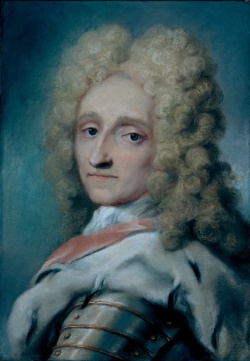Royal Surveillance
01. Sep. 2008

Portrait of King Frederick the 6th. Painted by Jens Juel about 1780. Oil on canvas. Dimensions: 74 x 58 cm. The National History Museum at Frederiksborg Castle.
Postal surveillance has never before been the object of thorough investigations in Denmark, and Sune Christian Pedersen has therefore been on an impressive expedition in the Danish archives. The result is a book full of dramatic narratives about the performance of the ignominious task and about the juridical and political consequences of the surveillance.
Two Kings and a Court Spy
The reader gets close to the principal characters of the book: Court Spy Christian Christoffer Erlund (1673-1754), King Frederick the 4th (1671-1730), and Crown Prince Frederick, later King Frederick the 6th (1768-1839). With these three characters as the centre of rotation the different varieties of postal surveillance are mapped: The secret postal espionage which was mainly used by Frederick the 4th by means of his spy Erlund, the undisguised censorship of letters which was used under Frederick the 6th to control and oppress govern-ment critical feelings among the population, and the admini-strative postal surveillance that came about by virtue of the way the postal service was organized and which gave the postmasters a great insight in who was writing letters to whom. In addition we have the fates of all the victims, to whom the postal surveillance became decisive for their lives and sometimes deaths.
A Public Secret
Neither Frederick the 4th nor Frederick the 6th made a secret of the postal surveillance so letter writers were aware of the risk that the authorities might read their letters. Despite the fact that the kings received less information about potential opponents in this way, they considered the letter medium such an important threat that they wanted to discipline it. There was, however, no security in using other channels for one's letters than the postal service. Even here there was a risk that the letters would be intercepted. The conception of the possible third reader influenced the letter culture of the society lastingly.

Portrait of King Frederik the 4th, painted by Rosalba Giovanna Carriera i n 1709. Dimensions: 58 x 41.4 cm. The National History Museum at Frederiksborg Castle.
Loyal and Vigilant
Loyal rhymes with royal, but to whom should the post-masters me most loyal: the king of the customers? The postmasters usually did what they could to safeguard the confidence of the customers, but unlike today there was no such thing as constitutional inviolability of the citizens' privacy, including their exchange of letters. The king was always allowed to read over the shoulders of his subjects. Even Frederick the 6th, who issued a decree to all post-masters in the country in 1784 prohibiting the "opening or breaking of anybody's letters", added at the same time the following exception: „unless by His Royal Majesty's special most gracious order". Sune Christian Pedersen shows how the postal service gradually began to take the side of the customers, and he is linking this change to the creation of the modern public servant.
In this way Broken Seals inserts the history of postal sur-veillance into Danish history and draws lines to the political culture, Danish foreign policy, and the mentality history of public administration.
Broken Seals will be published (in Danish) on 28th October 2008 and the price is DKK 298 (+ DKK 60 p&p). The book contains a wealth of illustrations and a summary in English. For ordering please call 33 41 09 00 or send an e-mail to museum@ptt-museum.dk.
This article may be copied or quoted with MuseumsPosten, Post & Tele Museum as source.
Comment this article
Only serious and factual comments will be published.